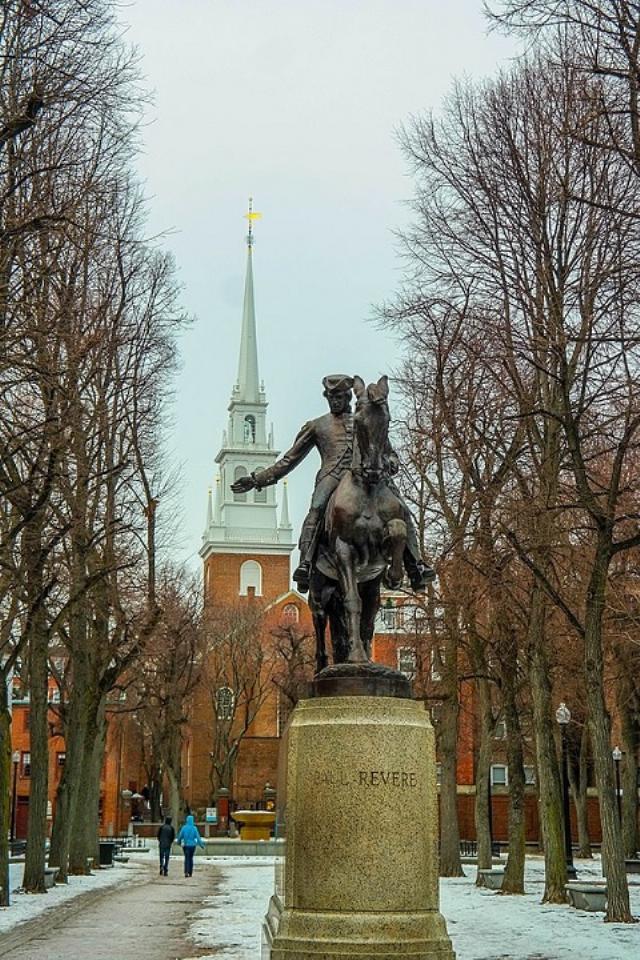Myths of the most consequential country in history
Biden’s campaign just released an ad to sow more Dem discord following the reasonable SCOTUS presidential immunity ruling. The mangled message of the “250 Years” ad is that for the first time in nearly 250 years the president is above the law -- that he is essentially a king. In their perverted minds, Donald J. Trump could be unbound when he returns to the White House.
Of course, that’s unfounded fearmongering -- we already had him for four great years (COVID notwithstanding). In reality, it is Joe Biden who has been unbound, and unable, and unadvised, and unaware, and “un” just about everything. But this Independence Day (and subsequent weekend) period may be a time to dispassionately reflect on some of our legacy beliefs, including the tyranny of King George III, to whom they implicitly compared “above-the-law” Trump.
First, consider the legacy belief instilled by Henry Wadsworth Longfellow’s embellished account of Paul Revere’s Midnight Ride, which still pervades our national consciousness.
It’s unlikely that Paul Revere exclaimed, “The British are coming, the British are coming,” for they were already here. Everywhere. Besides, why attract attention to himself during a clandestine mission to alert people in Lexington? Revere (one of three midnight riders who warned of British troop movements that night) admitted that he dodged British troops.
The Boston Tea Party is also shrouded in myths. It was contemporaneously denounced by George Washington, declaring the hooligans as criminals. Benjamin Franklin insisted the perpetrators, who chucked a bunch of perfectly good tea into the water, reimburse the owners.
Perhaps the most consequential of our legacy beliefs (or is that myths?) is that the Last King of America, King George III, was an irredeemable tyrant. Sure, the American patriots passed him off as such, for that served their just revolution. The tyrant label was pretty much cemented in the popular imagination by the Declaration of Independence, with its 28 clauses declaring the King’s misdeeds.
But some of it was imagined, then purveyed to instigate a popular revolt. Thank goodness they did, for we are all indebted to our courageous founders. They invented separate but equal government apparatus and legal systems that confronted the perennial perplexities incumbent on a civil society -- for example, balancing individual freedoms versus the imperatives of law and order. There’s was a righteous cause, a watershed moment in the evolution of human enlightenment, even if King George III’s tyrannical reputation was exaggerated.
Considering his debilitating madness, George III wasn’t such a bad chap, especially by the standards of the time. He acted as a constitutional monarch supporting the initiatives of his ministers. Per Andrew Roberts, author of The Last King of America, he was a “good-natured, enlightened constitutional monarch, who inconveniently for the Founders also genuinely admired the Glorious Revolution of 1688 as much as they did.”
That conclusion is supported by thousands of pages of George III’s papers, expertly curated in the Georgian Papers Programme.
Then there’s Alexis de Tocqueville’s opus Democracy in America. Published in 1835, fifteen years after King George III’s death, it covers periods during which the British monarch ruled. Here’s one noteworthy passage (PDF, pg. 53): “The English colonies have always enjoyed more internal freedom and more political independence than the colonies of other nations.”
America is the most consequential country in the whole 500-plus years of the nation-state era. A beautiful, brilliant beacon of beaming light; luminiferous not only to luminaries like de Tocqueville, but to the world’s huddled masses yearning to breathe free. As pop legend Neil Diamond sang, “Freedom’s light burning warm. Freedom’s light burning warm. Everywhere around the world. They’re coming to America.“ As exemplified by the singer-songwriter, our national identity is long secured, and will be reinvigorated once the unbound Biden and his un-American enablers are unseated.
After a night of raucous celebrations on Independence Day, the firework’s red glare will fade into the dawn’s first gleaming. While rejoicing in our American birthright bequeathed to us by our brilliant Founders, in the cold light of day we can reflect on some of our founding myths. After all, it is quintessentially American to want to vindicate wrongfully convicted villains.

Image: TanRo
FOLLOW US ON
Recent Articles
- Transgender Armageddon: The Zizian Murder Spree
- Jasmine Crockett, Queen of Ghettospeak
- The Racial Content of Advertising
- Why Liberal Judges Have a Lot to Answer For
- Dismissing Evil and Denying the Holocaust — What’s the Endgame?
- The Witkoff Warning: Will Jordan’s King Fall?
- Can Trump Really Abolish the Department of Education?
- Carney’s Snap Election -- And Trump Saw It Coming
- We Can Cure Democracy, But Can We Cure Stupid?
- George Clooney: Master of Cringe
Blog Posts
- Two new revelations about the Signal leak, along with two theories
- Big Tech’s Invisible Hand: How Google and Meta manipulate our elections
- New report: Netherlands is now euthanizing minors
- Tantalizing tidbits: Five news stories about leftists, and sea lions, acting aggressively
- Rockets to Roses: Israel’s bizarre trade cycle with Aza
- Fort Knox? Gold cams!
- There is no birthright citizenship for illegal aliens
- Turn off the phone. Close the laptop.
- Nine reasons Democrats are doomed to irrelevance
- Wagner College should restore Trump’s honorary degree—and set a national example against cancel culture
- The Signal Scandal was a nothingburger, but the WSJ takes the opportunity to attack Vance
- The Trump effect: An unprecedented investment surge and economic renewal
- Hydrocarbon-friendly Trump a match for energy-hungry India
- And Big Bird can’t sing
- The DC appellate court order affrming Judge Boasberg dishonestly ignores its lack of jurisdiction






